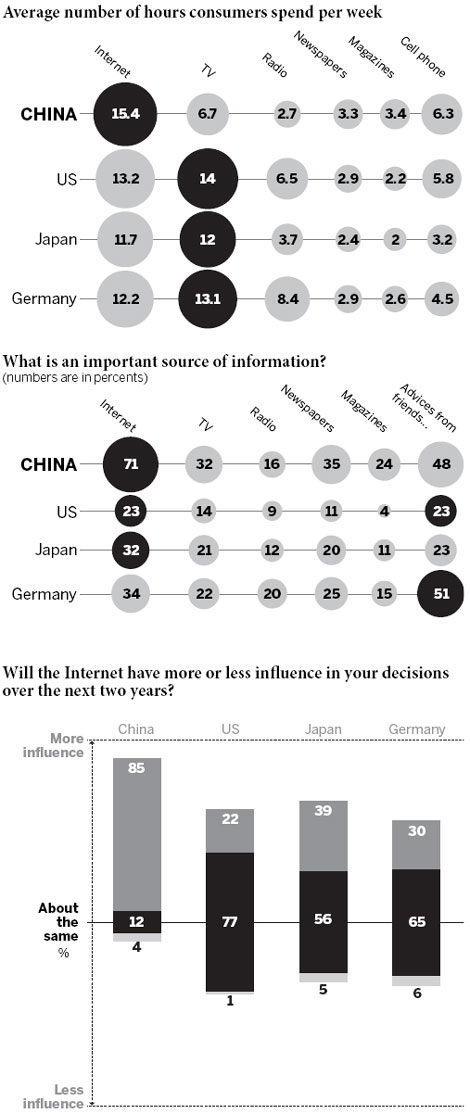Internet plays integral role in decision-making

The Digital Influence Index is Fleishman-Hillard's annual global research platform for uncovering how the Internet is not only informing and connecting consumers, but the way in which it's driving decision-making.
This study measures several key aspects of consumers' use of the Internet, from media consumption patterns, to the degree of adoption of various digital behaviors, to involvement with online social networking.
In its second year, the study has expanded from France, Germany and the United Kingdom to include Canada, China, Japan and the United States. Together, these seven countries represent 48 percent of the global online population.
The online survey took place between December 2009 and January 2010. The data was quota sampled and weighted to be representative of the online populations of each country.
One of the most interesting findings that we got in the survey, is that although the Internet is by far the most important medium in the lives of consumers, companies continue to under-invest in their online marketing efforts.
The Internet has roughly twice the influence of the second strongest medium, television, and about 10 times the influence of print media.
Although companies have been increasing resources applied to web-based activities like social media, online advertising, developing web properties and search management, there is still a gap between the relative importance of different media and spending on the media mix. One example is in the area of advertising.
Globally, online advertising captures only 14 percent of the total advertising market, yet based on time spent online and influence of that time, this is far less than what could be expected.
The Digital Influence Index underscores the importance of that gap, showing that it is not just about the amount of time consumers spend on the Internet but about its influence on their perceptions, attitudes and behaviors.
This suggests a strong opportunity for companies to continue to rebalance their media mix to address an unquestionable shift in the media influence patterns of consumers worldwide.
Internet in China
Although the Internet is the most important medium in all countries, it plays an even more critical role in China, home to the world's largest and fastest-growing population of online consumers.
According to a 2009 Nielsen study, China now has the largest population of online consumers at 330 million, more than the entire population of the United States.
However, only 27 percent of China's total population is online, compared to around 60 percent in more mature markets, leaving significant room for growth.
Beyond the sheer size of this online population, Chinese Internet users are much heavier users of most Internet behaviors, such as researching, communicating or self-expression through using social media tools, than their counterparts in other countries.
They also are much more advanced in their use of the Internet across a wide range of activities and behaviors, from researching to using mobile capabilities.
This may be, in part, because China's market is still developing, with Internet access adopted by a minority of the population likely to be made up of more technically adept early adopters compared to more mature markets.
According to one source on Internet penetration (China Internet Network Information Center, 2010) Internet use in China went from less than one percent of the population to more than 28 percent in the 10 years since 2000.
This is the most rapid shift in communications and technology uptake in human history. Time will tell whether Chinese Internet users begin to resemble the more mature markets as more of its overall population comes online, or if this outsized heavy use of the Internet will remain a national characteristic or if the more mature markets come to resemble China.
What we also find in the survey, is that the Internet not only provide entertainment for users, but also plays an integral role in the decision-making process.
Users incorporate the medium into their decision-making process. Those decisions range from where to meet a friend for lunch, to what television to purchase, to how to invest in the stock market.
Internet users report that online resources not only allow them to quickly and easily compare options, but also to seek out expert and peer advice that enables them to act with greater confidence.
Search engines are critical to the online decision-making process and often act as the launching point for consumers' research.
While the type of source referenced depends upon the decision being made, search engines serve as the link between users and blogs, company web pages, government-sponsored sites or social networking tools.
Brian McRoberts is a senior vice president at Fleishman-Hillard with 15 years of experience in online business models, technology, branding and advertising.

 0
0 






